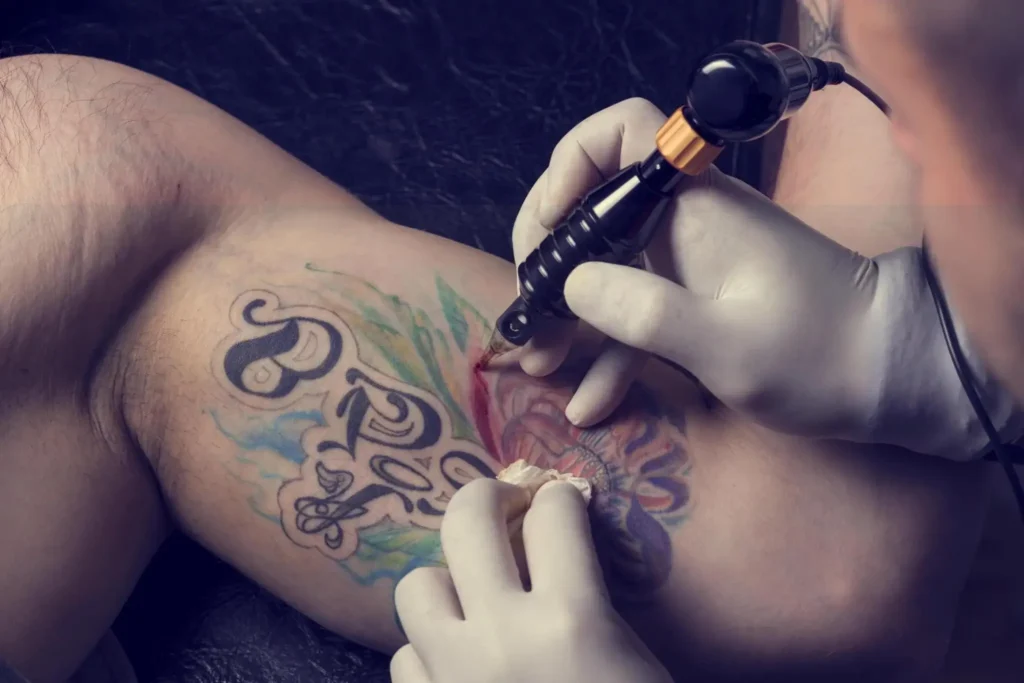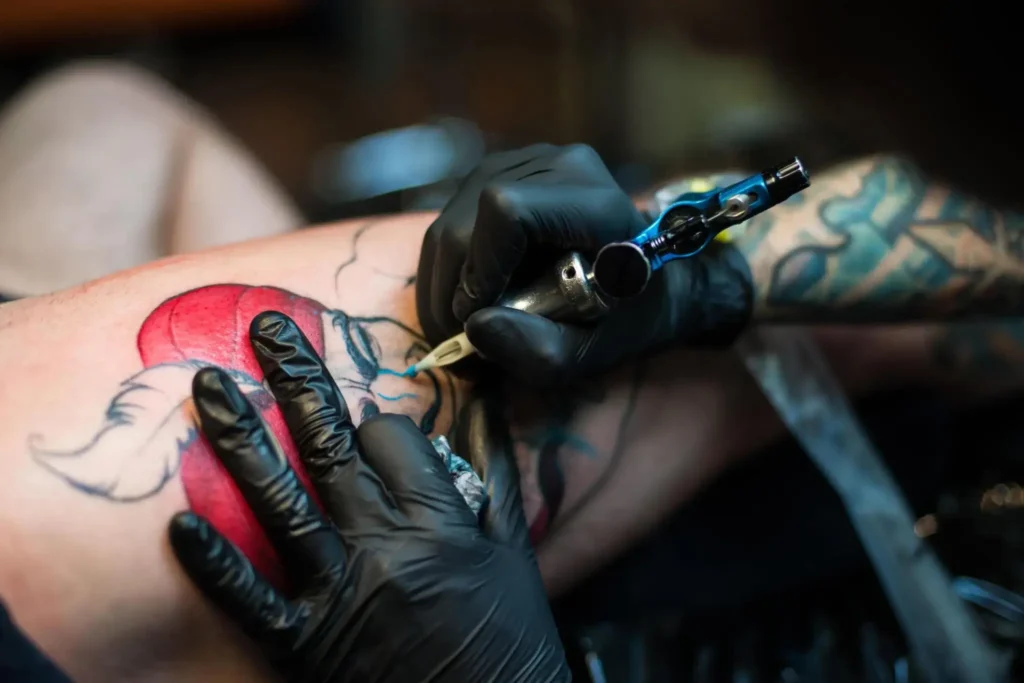After long hours and sitting for a long time when you are getting inked, the last thing that you want to do quickly is heal faster. But at the start, you will face itching, and blisters, and become very irritated. This is not common, but some people who do not follow proper tattoo aftercare guidelines have experienced these allergic reactions to their fresh tattoos. If you’re considering getting a tattoo, learn how to determine your tattoo allergy risk before you get it.
What are Tattoo Allergies? You Need To know
Those people who love to express their feelings with all of them, for those tattoos are the best way to express our feelings and the human body is the best canvas for artists to show their art. However, for some people, the experience of getting inked can be faced with unpredictable reactions due to tattoo allergies. An allergic reaction can be minor or severe, depending on the condition of the irritation. Let’s explore together how you can stop tattoo allergy reactions and treat it in the best way.
Tattoo Ink Allergy
First thing if anyone has a tattoo ink allergy, then it will get tattoo ink then they will face an allergic reaction. An unpleasant side effect of body art is the possibility of an immune reaction, which can range from mild to severe. It is also possible to develop an allergic reaction to tattoo ink if you already have a skin condition. You can also face sun exposure reactions wherever you are tattooed. Which will also be the reason for irritation.

You should not worry about tattoo ink allergies because they are very rare. Quite a small percentage of tattoo lovers will face a negative reaction to getting tattooed. But if you do not treat well, you will face serious consequences. In some tattoo cases, the reaction shows instantly but in the second scenario, it will react after 48 hours.
Types of Tattoo Allergies
The symptoms of allergic reactions to tattoo ink are very similar to those of common tattoo healing, which might confuse people who are allergic to tattoo ink. For beginners, those who are considering getting a tattoo must need to know the symptoms and signs of tattoo allergies. Here I am mentioning the major signs of allergic reaction that help you to stop any damage to your tattoo quickly.
Important Symtoms of Tattoo Allergy Include:
- Itchiness
- Skin rash
- The sensitivity to the sun, or a sun allergy
- Flaking skin
- Inflamed skin
- Itchy, stinging, or oozing pustules
- Keloid Scars on Their Skin
Act immediately if you notice any of these symptoms. Because you need to fix it quickly and improve your tattoo appearance and skin health.
Common Allergens in Tattoo Ink
Different kinds of components in tattoo ink can cause allergic reactions.
- Metallic Compounds: Tattoo ink sometimes contains metallic compounds like cobalt, nickel, or mercury, which are allergens to some people.
- Pigment Additives: These additives can cause allergic reactions, particularly red pigments made using cadmium or mercury sulfide.
- Preservatives: Many inks contain preservatives to extend their shelf life, such as formaldehyde or parabens. These types of things can also cause allergic reactions in sensitive people.
The first thing that you need to understand is the composition of tattoo ink and its possible allergens. It is necessary to reduce the risk of negative reactions.
Allergic Reactions Caused By Tattoo Ink Colors
Most trusted and reputable tattoo shops and professional artists use top-quality tattoo ink. All of the tattoos that we make are a great piece of art, and every professional artist wants the colour of the tattoo to remain active and shine for a long time. It doesn’t matter if the quality of the ink, every ink contains that type of chemical that will be the cause of an allergic reaction. But don’t use low-quality ink.
The situation is complex, however. It is possible to be perfectly fine with one shade and rashy with another because different colors require different heavy metals.
Learn About The Heavy Metals In Every Color of Ink:
Yellow Tattoo Ink
Yellow tattoo ink comes with cadmium sulfide and may have consequences for maximizing photosensitivity. So that’s why you need to save your tattoo from direct sunlight and UV rays.
Black Tattoo Ink
Black ink may cause allergic reactions if it comes with components like logwood, iron oxide, and carbon. A spot of black ink is different from other inks and dyes in that it is suitable to break down over time and cause problems later in life.
Red Tattoo Ink
As we all say, red is a sign of danger, but on a lighter note. Pigments of red ink are quite popular for the reason of skin reactions. It is common for people with allergies to develop dermatitis from red tattoo ink and lichenoid from tattoo ink allergies.

Chemicals and components in ink have been known to reason for fading, including ferric oxide (iron oxide), sandalwood, ferric hydrate (sienna), mercury sulfide (cinnabar), and brazilwood. But a few red inks come with cadmium and iodine, which Some red inks also contain iodine and cadmium, which is the reason a lot of people suffer from sensitivities.
Blue Tattoo Ink
There can be damaging skin reactions associated with blue ink, which is often made from minerals. The combination come with azurite, cobalt blue, cobalt aluminate, and sodium aluminium silicate.
How You Understand You Will Be Allergic?
If you are getting tattooed for the first time, professional tattoo artists normally ask you to visit the shop first. Before 24 hours, you should ensure that you make your appointment with the artist and once done patch your patch test.
You’ll normally be tattooed on the ear or somewhere near it, so the tattoo artist will put a tiny amount of ink on bare skin before starting the tattoo. There could be an allergy to the ink’s ingredients if there is a reaction within 24 hours.
There is also a second test, the dot test, which involves tattooing a single dot of ink onto a section of skin. Then you need to strictly monitor your skin for 24 hours and see what happens. If you see redness or swelling on your skin it simply means that you have an allergic reaction.
Treat Your Allergic Tattoo Reaction
If you’re around your tattooed area will you feel swelling, itching, and flaking? Then it could be an allergic reaction. Over-the-counter medication can be used if the symptoms are mild. It is best to take antihistamines. Hydrocortisone is a topical ointment that soothes irritation as well.
Please consult your dermatologist or basic care physician if the reaction becomes more severe. If you are experiencing a reaction, you may require stronger medication. Any infection will need antibiotics.
- Topical Treatments
- Oral Medications
- Laser Tattoo Removal
If you feel a severe reaction then you need to remove your tattoo with the help of laser tattoo removal but it is quite a rare cases.
Summary
Allergies are very irritating and it destroys your tattoo. Sometimes you need to remove your tattoo because of a tattoo allergy. It is more irritating. That’s why you can pick your tattoo colour very carefully. Before you get you will need to take a dot or patch test, and also discuss with your artist the reaction possibility. In any case, if you find an allergy, don’t panic and don’t worry about it. There are other alternatives available, including organic ink and exclusive mixtures. For more tattoo solutions, follow tattoorecover.com.
FAQs For Tattoo Allergy
Can anyone develop a tattoo allergy?
Tattoo allergies can develop in anyone, but people with preexisting skin conditions or allergies are more likely to develop them.
How common are tattoo allergies?
The possibility of tattoo allergies is relatively rare, but it is possible, especially if an individual is hypersensitive to specific components in ink.
Are certain colors of tattoo ink more likely to cause allergies?
In some studies, red and yellow pigments are suggested to be more allergenic than other colors. However, reaction rates differ among individuals.
Can tattoo allergies be permanent?
With suitable treatment and avoidance of allergens, tattoo allergies will normally resolve on their own. There are, however, rare instances when they may persist for quite some time.

14 thoughts on “Tattoo Allergy: Can You Be Allergic To Tattoo Ink?”